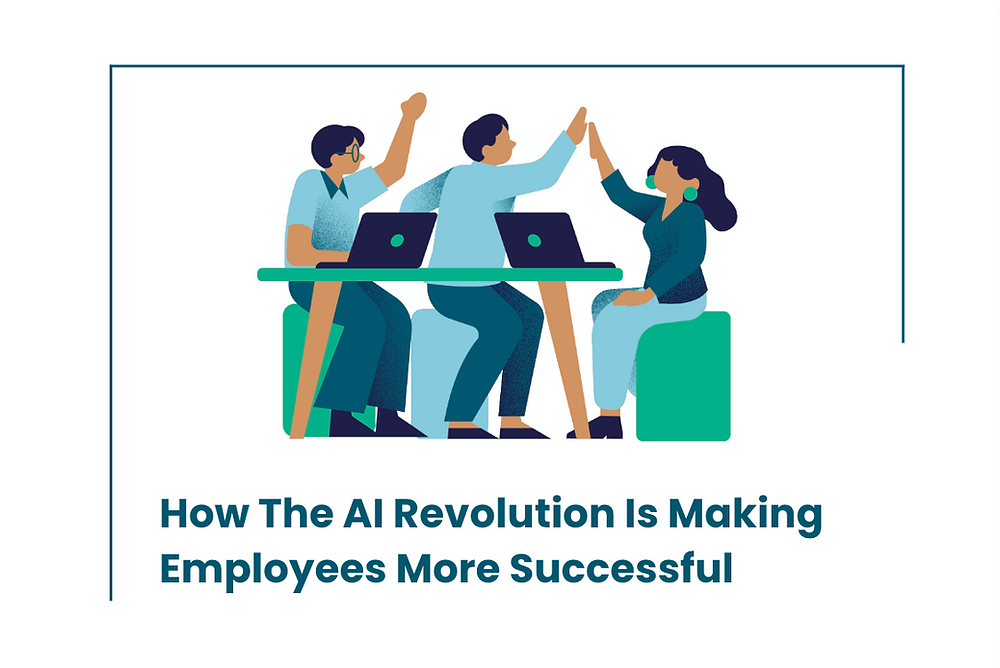The entire corporate world is sitting up and finally paying attention to AI’s impact on the economy. But it isn’t only business owners and leaders who wonder if ChatGPT or Google Bard can revolutionize their operations. Nowadays, employees are running scared about AI’s influence on their careers.
According to a new poll commissioned by CNBC, 24% of workers fear they will lose their job to AI. In certain job functions like marketing, this percentage jumps to a startling 46%. It’s safe to assume such worries will dramatically affect how employees perform on the job.
At the same time, it’s also easy for business owners considering AI implementation to imagine an angry mob of workers carrying pitchforks and torches at the slightest mention of artificial intelligence. Even so, the AI experts at my organization Louder Co. believe both parties should calm their fears. When the right AI tool is put in place with the support of experts, humans don’t lose their jobs. They instead become much more effective and engaged.
Human capital is widely regarded as the most important asset of small and medium businesses. Employees bring deep knowledge and skills to the table and are on the front lines, working with customers, carrying out the culture and vision of organizations daily. Very few—if any—business owners would prefer to trade them in for an army of soulless AI-driven bots, yet the fear remains that using AI for business automatically means replacing people.
To this point and as noted earlier, fear surrounding AI varies between job functions. Mike Rowe of Dirty Jobs fame believes blue collar workers have little to fear from AI, explaining in a recent interview that, "I haven't seen any plumbing robots. I haven't seen any electrician robots. And I don't think we're going to see any artificial intelligence in the skilled trades to that degree.”
But not everyone shares Rowe’s confidence, especially workers in marketing and sales. This represents a challenge recently brought to the Louder Co. team by Roberta, CEO of a medium-sized manufacturing business. She began our intro call with this query: “Can our company benefit from AI without making our employees feel their days are numbered?”
“Yes,” I told her. “That’s what Louder Co. does with clients every day.”
We began our work with Roberta by determining her pain points. Her company produces complicated electrical equipment typically installed in commercial buildings for manufacturing facilities, data centers, and other applications known to use high amounts of electricity. Their product is excellent, but closing deals can depend on myriad outside factors, like construction schedules and the installation of other systems.
As a result, lead times tend to suffer. This means the sales team gets bogged down with endless follow-ups, chasing down business instead of uncovering new potential customers. In recent years, Roberta has struggled to help her sales team achieve success, resulting in retention problems. That’s a tough problem in the best of times, let alone in today’s hot jobs market.
Louder Co. soon discovered the sales process at Roberta’s company was entirely manual. She could give us certain metrics, like the average close time, but every salesperson used a different approach. There wasn’t a consistent way to track the sales cycle, or the effort required to land each deal. Based on our assessment, we knew the answer wasn’t to try to replace the sales team with AI bots or any similar “worst case scenario” Roberta’s employees might dream up. Instead, the best play was to use AI to help her salespeople work more efficiently, especially to avoid getting lost in needless customer follow-ups.
Because Louder Co. works with the entire universe of AI solutions, we’re able to source the optimal fit for each client—instead of shoehorning them into a limited number of platforms. In Roberta’s case, the answer we landed upon was Gong, an AI-fueled revenue assistant trusted by 3,500 companies globally. Gong’s focus is on producing intelligent insights about the sales process and customer journey so businesses can better spend their time converting instead of being administrators.
With the help of the Louder Co. implementation team, it was painless for Roberta’s sales force to implement Gong. Better yet, they enjoyed immediate results. For the first time, salespeople could leverage an accurate picture of the sales cycle, especially what it took to close deals.
Gong also made recording each interaction with customers effortless. Meanwhile, AI analyses performed in the background cut down time spent on forecasting by half—while significantly increasing accuracy. Previously stymied salespeople suddenly felt confident. That’s because their close rate soared, demonstrating the new approach’s efficacy. Perhaps best of all, without the needless pressure of a confusing sales cycle and the feeling they were “just spinning their wheels,” Roberta’s salespeople were listening to customers, bringing up insights with the potential to revolutionize the company.
Within six months of Gong’s implementation, two sales managers approached Roberta with a new awareness their reps had gained from clients. Multiple customers remarked on how strongly her company’s products worked when stacked against a different vendor’s system.
Since this other outfit wasn’t a direct competitor to Roberta, this intel gave her an idea: Why not collaborate on proposals for major projects? Inspired, she contacted the other company, which had recently gained the same insights from their own salespeople. Both organizations saw value in a combined pitch leading to more revenue and faster installations.
The transformation of Roberta’s sales process with a helping hand from AI was staggeringly fast. It also didn’t negatively impact her human staff. On the contrary, her company’s retention problems vanished. The sales staff felt happier, and more engaged at work. Your company can enjoy the same type of quick wins that benefit both your organization and your people. Just contact Louder Co. today to learn how we can empower your employees’ success through the intelligent application of AI.


